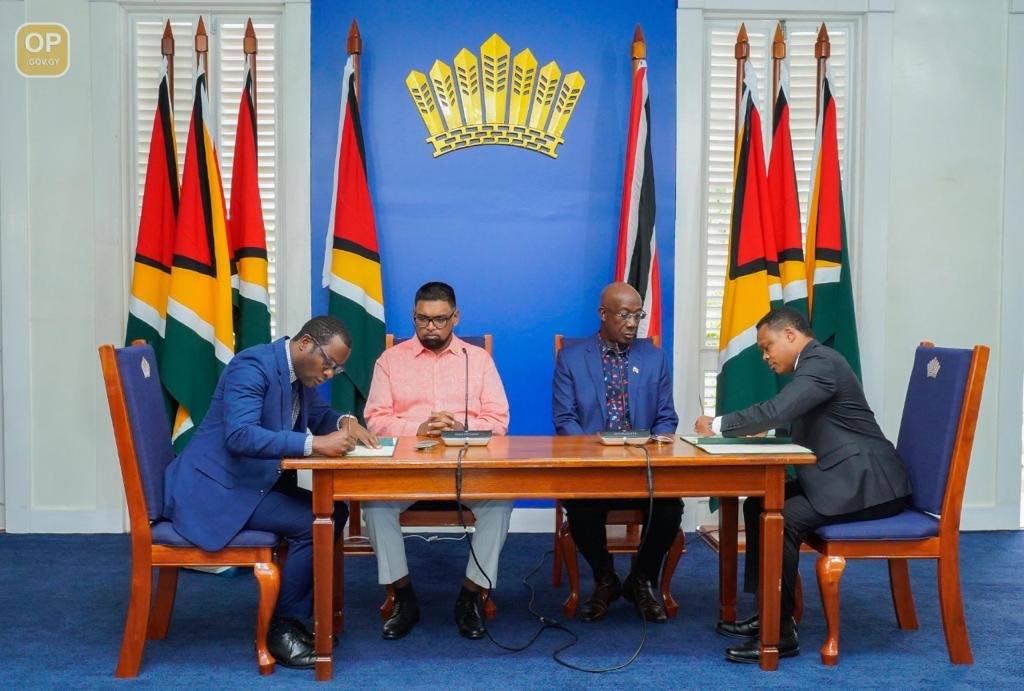Trinidad and Tobago, Guyana sign agreement to strengthen trade relationship

A memorandum of understanding (MOU) on renewed and enhanced co-operation was signed on Sunday between Trinidad and Tobago and Guyana.
The commitment by the countries came after a three-day Agri Investment Forum in Guyana which was held between May 19 – 21.
The agreement seeks to address partnerships in areas of trade and investment including non-tariff barriers, agriculture and food security, energy, infrastructure, security, education, tourism, sports and culture; with the aim of developing strategic co-operations and partnerships for both countries.
Oversight of the execution of the MOU would be under a newly established bilateral commission which comprised of both the private and public sectors.
TT’s Prime Minister Dr Keith Rowley, Guyana’s president Dr Mohamed Irfaan Ali and both foreign affairs ministers signed the MOU which was followed by a media briefing.
Rowley said the agreement showed that Caricom could seek and find solutions to its many problems, especially in agriculture which was left vulnerable during the pandemic.
“In this covid19 period we found ourselves being denied access to our normal food supplies which comes to us from Australia, New Zealand, Ukraine, Russia and the US. Our supply models are that we get our food from other people’s efforts in faraway lands.
“During the height of the covid19 period at the extent of our vulnerability, where even when we had money in hand, we could not buy food. That situation is not going to change, it is going to get worse. Now is the time to do what has to be done,” he said.
Rowley called on the private sector to refocus their investments in areas of food supply, production, transportation, processing and distribution.
He added that Caricom urgently needed to make shifts in its investment patterns, partner with technical expertise and become insulated from external pressures.
“We have to look at what Caricom can and must do within Caricom to disentangle ourselves from the tenuous world food supply, that will get more troublesome, and put our shoulder to the wheel within Caricom to our own production systems, changing our supply and business models to put ourselves in supply situations that will not be impeded, destroyed or obstructed by other people elsewhere in the world,” he explained.
Ali, who also holds the responsibility for agriculture in the Caricom Quasi Cabinet agreed that an important aspect of the MOU was private sector involvement and the discussions with TT will be positive.
“We want the private sector of both countries to be fully on board, we want the investors of both countries to be fully on board, but importantly we want the people of both countries to be on board.”
He said Guyana was well aware of the challenges that lie ahead but was determined not to miss any opportunities for its growth and development.
There has been concern by the Georgetown Chamber of Commerce and Industry which publicly stated that Guyana should not sign any MOU with TT citing issues of non-tariff barriers.
Ali said Guyana saw the MOU as a commitment to secure the futures of both countries and it was being carried out from a political level to ensure the policies and contents were achieved within a reasonable time frame.
“It gave us an opportunity to not only examine a sector, but it gave us an opportunity to take the bull by horn and to identify, in a very open and frank way, missed opportunities to help identify opportunities in the future and blocks to those opportunities.
“We are not naive. We are not unaware of impediments or blocks or constraints or challenges. At the end of the day, we are not only neighbours, we are not only part of a community, we are also part of a family.”
He added that transportation between the two countries was critical and an experimental ferry system to transport people and goods was being explored by both governments.


Comments
"Trinidad and Tobago, Guyana sign agreement to strengthen trade relationship"